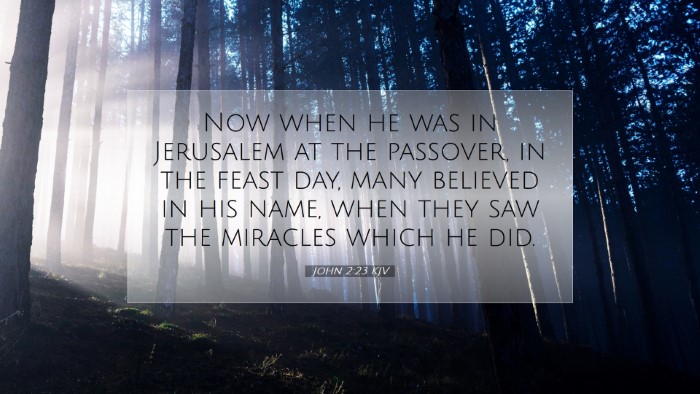Old Testament
Genesis Exodus Leviticus Numbers Deuteronomy Joshua Judges Ruth 1 Samuel 2 Samuel 1 Kings 2 Kings 1 Chronicles 2 Chronicles Ezra Nehemiah Esther Job Psalms Proverbs Ecclesiastes Song of Solomon Isaiah Jeremiah Lamentations Ezekiel Daniel Hosea Joel Amos Obadiah Jonah Micah Nahum Habakkuk Zephaniah Haggai Zechariah MalachiJohn 2:23
John 2:23 KJV
Now when he was in Jerusalem at the passover, in the feast day, many believed in his name, when they saw the miracles which he did.
John 2:23 Bible Commentary
Commentary on John 2:23
John 2:23 states: "Now when he was in Jerusalem at the passover, in the feast day, many believed in his name, when they saw the miracles which he did."
Introduction
The passage in John 2:23 captures a pivotal moment in Christ's ministry. It reflects on His miraculous works during the Passover in Jerusalem and the resultant belief of many witnesses. To understand this verse thoroughly, we will engage with insights from historical and theological commentary.
The Context of John 2:23
This verse occurs shortly after the wedding in Cana, where Jesus performed His first miracle by turning water into wine. The Passover feast, rich in symbolism and communal worship, serves as a backdrop for the unfolding revelation of Jesus as the Messiah.
Insights from Public Domain Commentaries
-
Matthew Henry's Commentary:
In his analysis, Henry emphasizes the significance of **miracles** in bolstering faith. He notes that many were drawn to Christ not solely because they understood His divine nature but primarily due to the immediate effects of His works. This prompts reflection on the nature of belief and the role of signs and wonders in drawing individuals toward faith in Christ.
-
Albert Barnes' Notes:
Barnes asserts that the miracles of Jesus served two primary purposes: **proclaiming His divinity** and **demonstrating His compassion**. He points out that while belief in His name was sparked by these miracles, it raises questions about the genuineness of such faith. Are believers responding to the promise of miracles, or are they engaging in a deeper spiritual relationship with God?
-
Adam Clarke's Commentary:
Clarke focuses on the **geographical and cultural significance** of the Jerusalem setting. The Passover was a time when thousands traveled to the city, making it a ripe environment for Jesus's ministry. He mentions how the context of communal gatherings can influence individual faith experiences, suggesting that witnessing miraculous events in such settings may catalyze belief.
The Nature of Faith in John 2:23
This verse presents a form of belief that is often transactional – the people saw miracles and responded with faith. However, pastoral reflection on this passage reminds us that true faith must evolve beyond mere observation of miracles into deeper trust and commitment to Jesus.
Miracles as a Catalyst for Belief
It is important to note that while miracles play a significant role in stimulating faith, they are not the final goal of Jesus's ministry. Henry and Barnes underscore that the ultimate purpose of Christ's signs was to reveal His character and mission as the Savior.
Warnings Against Superficial Faith
Following this verse, John 2:24-25 highlights Jesus' awareness of the superficiality of the faith exhibited. Jesus did not entrust Himself to those who believed based on miracles alone. This serves as a caution for modern readers to consider the depth of their own faith and motives behind their belief.
Theological Implications
-
The Sovereignty of God:
This passage encapsulates the interplay of **human belief** and **divine authority**. It illustrates that while people believed in Jesus based on His miracles, it is God who draws individuals to Himself. Understanding this dynamic is crucial for theological discourse and pastoral care.
-
The Call for Discerning Faith:
As believers develop in their spiritual journeys, there is a continual need for discernment. The authenticity of faith must be evaluated not just by initial responses to miraculous events but by a sustained relationship with Christ through prayer, study, and obedience.
Conclusion
John 2:23 challenges pastors, students, and theologians to grapple with the nature of faith. While miracles can lead to belief, they should not be the sole foundation of a person's relationship with Christ. True faith must call for deeper spiritual engagement, moving beyond initial responses to a more committed and discerning walk with God.


